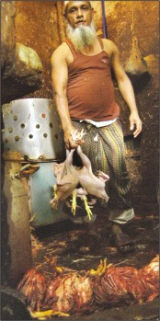



Mechanised Chicken De-Feathering May Not Be A Favour For All
INDIA - Rasheda Khanom, a homemaker from Taj Mahal Road, Mohammadpur, bought eight chickens from the Karwan Bazar kitchen market and got them de-feathered mechanically to save her time. But consumers like her are totally unaware that along with the processed raw meat they may carry home pathogens that cause serious health hazards.
Mechanised de-feathering of chicken has become very popular among the city dwellers. Kitchen markets are providing the service for a very small charge but the whole process of semi-scalding and de-feathering of chickens is very unhygienic.
Dr Md Azmat Ali, veterinary officer of Dhaka City Corporation, said poultry birds have some bacteria underneath their feather in normal condition. During the unhygienic de-feathering process, the bacteria spread into the meat, he explained.
According to experts, Staphylococcus Aureus, Salmonella, E Coli are the most common bacteria, which spread several diseases in humans. Salmonella can cause typhoid fever and diarrhoea. E Coli causes urinary tract infections (UTI) and intestinal diseases while Staphylococcus causes food poisoning,
These bacteria can survive if the meat is not properly cooked. Restaurants, kebab and grill stores very often sell half-done meat, which can cause health hazards. Those who take care of the live chickens or the processing are more vulnerable.
Right after slaughtering, dead chickens are piled up. Semi scalding is done in warm water while feathers and skin is still on and blood, faeces and gut is still inside the chicken. During scalding process these elements including the germs mix into the water, which contaminates the meat. The same water is reused for scalding a fresh batch of slaughtered chickens.
The blood, faeces and gut remain inside during de-feathering. During and after de-feathering grows Clostridium Perfringens, which also causes diarrhoea. Clostridium Perfringens produces a toxin in raw meat. Some toxic spores survive during the cooking process and are not completely destroyed which later causes diseases like diarrhoea.








